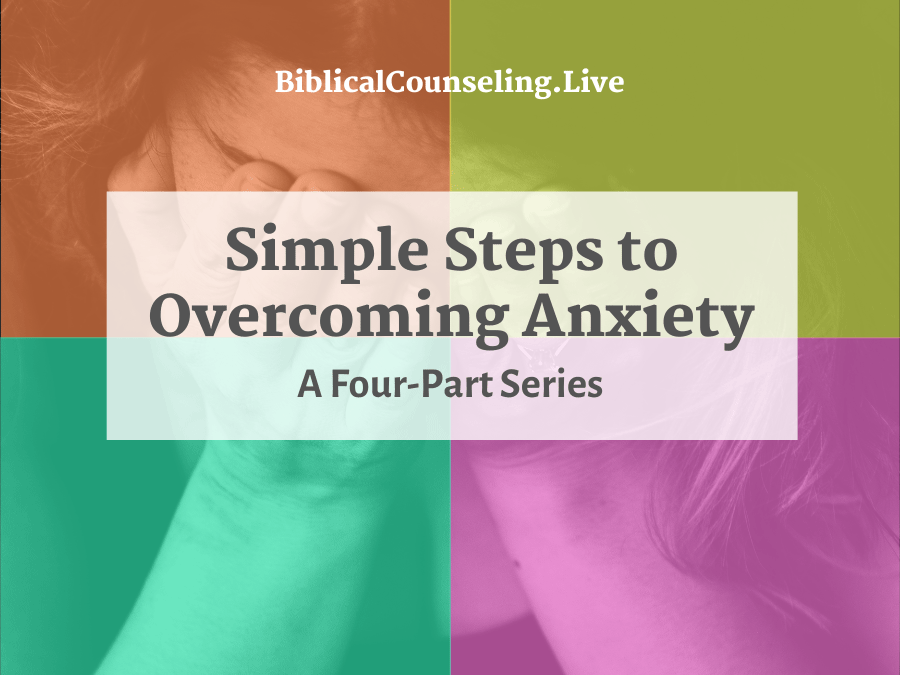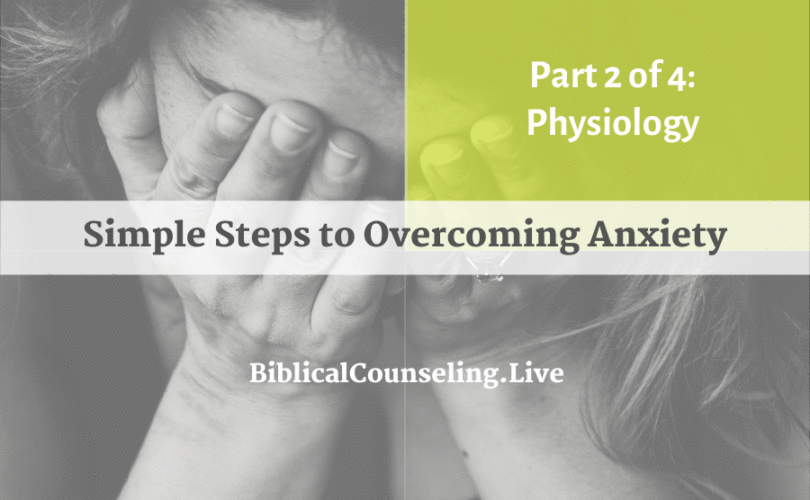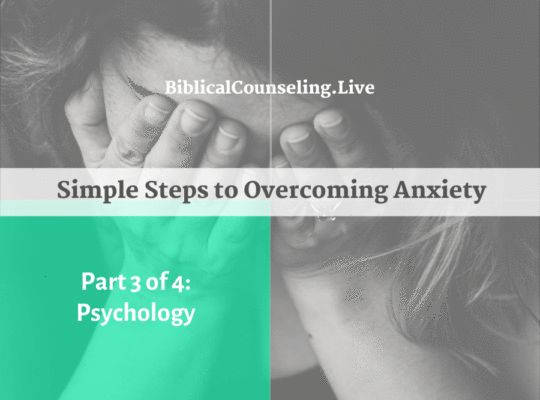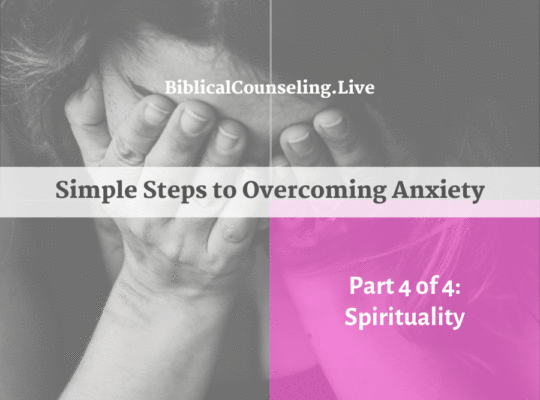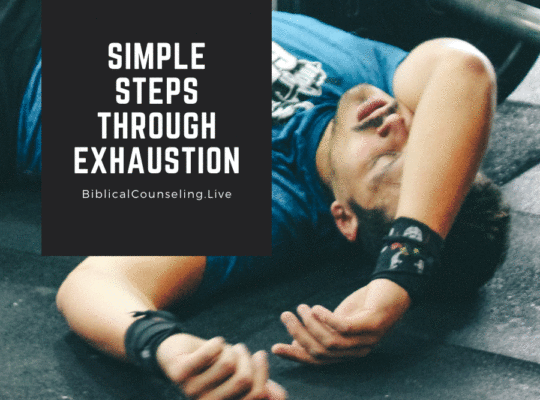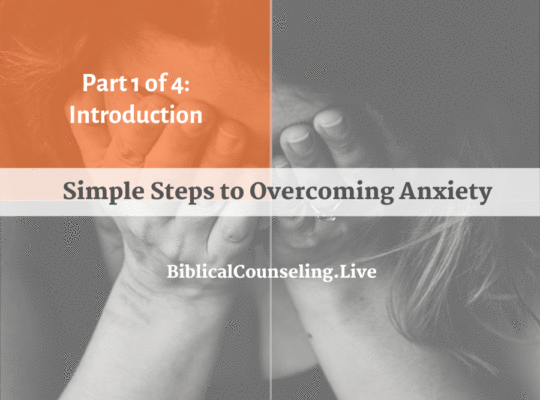Original Post Date: June 10, 2019
Part 2 of 4
After the introduction to this series was posted, I had several people quietly pull me aside and tell me about an experience of their own or of someone they knew who struggled with anxiety. As often happens in the church, a well-intentioned Christian admonishes someone regarding the sin of anxiety… only to find out later that the person had an underlying medical condition that was causing the physical symptoms. Once the medical condition was addressed, the person stopped struggling with the physical symptoms of anxiety.
Now I’m not saying that there weren’t sin issues that resulted because of the condition, or that the person didn’t struggle with sinful anxiety to begin with. I wasn’t there to make that judgment. However, I DO know that many people in the church suffer silently with symptoms of anxiety because they have an inaccurate understanding of the sin of anxiety, and/or they are afraid of feeling like sub-par Christians.
As Christians, we must be slow to speak and quick to listen (Jam. 1:19), so that we can accurately discern the situation (Heb. 5:14, John 7:24), and then patiently respond with encouragement, admonishment, and help (1 Thess. 5:14).
When someone tells me she is struggling with anxiety, I ask when it started. The most usual response is that she can point to a particular season of life or event, like the death of a loved one, a physical injury, a traumatic event, or the birth of a child. The second most common response is a sense of being overwhelmed with the pressures of her life – pressures defined by either herself or someone else. Other times, she tells me that she can’t remember a time in her life when she DIDN’T live with anxiety or fear.
No matter when it started, the physical symptoms of anxiety are often the most debilitating. When we are in pain or when we are in fight-or-flight mode, our brains actually work differently and make “thinking straight” difficult. It is extremely hard to think straight about ANYTHING when your heart rate is 120 bpm for no apparent reason, you feel like you’re going to pass out, and your limbs are going numb. You’re just trying to stay alive and conscious.
The First Step in analyzing anxiety is to assess the physical condition:
1. Remember that God created humans as body and soul
God created humans in a very unique way — we are body and soul, and each part affects the other (Gen. 2:7, Ps. 31:9, Pro. 16:24, Matt. 10:28, 1 Thess. 5:23). We were created this way on purpose; we are not to dismiss the body as non-essential, or evil. This is a theological error called Gnosticism. We are not simply spiritual beings trapped in flesh.
In fact, our physical bodies are so important to God that He will be giving Christians new, perfect ones to live in for all eternity on the New Earth (1 Cor. 15:49, Job 19:26-27). Don’t believe the cartoonists of the world — we are NOT going to be disembodied spirits floating around. We will have physical bodies that eat, feel, and work (Mat. 25:23, John 14:2, Luke 22:29-30).
When Jesus encountered someone with a physical illness, like the woman with a discharge of blood for twelve years (Luke 8:43-48), He did not ignore her physical distress. Instead, He connected the healing of her body with what was going on in her heart. He said, “Your faith has made you well; go in peace and be healed of your disease.”
In the same way, we must always treat people as body AND spirit, just as God made them. We cannot disregard the soul and just throw medication at the problem; we cannot disregard the body and just throw Bible verses at the problem. Therefore, we must always consider the physical aspect of anxiety.
2. Consider illnesses that may be causing physiological anxiety
Physical causes such as diabetes, heart disease, thyroid problems, respiratory disorders (including asthma), drugs (legal and illegal), chronic pain, irritable bowel syndrome, tumors, vitamin deficiencies, dementia, hormone imbalances, etc. can cause physiological anxiety. Because of this, be sure to go to the doctor and have him or her check for anything physical that may be going wrong.
Women often find that that the feelings of anxiety correspond with certain times in their hormonal cycles. Balancing hormones can help diminish those physical symptoms during those times.
Because physical symptoms of anxiety can be caused by serious medical conditions or can be side effects of drugs, if you are experiencing physical anxiety, be sure to see a doctor!
3. Consider physical habits that may be causing physical symptoms
Our bodies are very intricately balanced. It just takes one bad electrical impulse in your heart to make it stop. It just takes your blood sugar dropping too low or rising too high, and you die. There is little room for error. We are fearfully and wonderfully made! (Ps. 139:14)
Our culture will tell you that you can do anything you want and with the right pills or diet, your body will not fail you. This is a lie. We are not simple machines. On top of that, we are fighting the curse of death, so our bodies WILL fail us. What we do with our bodies GREATLY affects our ability to function, which alters our effectiveness in completing work in the Kingdom of God. (3 John 1:2, 1 Cor. 10:31, 1 Tim. 4:8, Prov. 31:17)
Sometimes, some common sense may be in order. If you are drinking nine cups of coffee per day and are feeling anxious, it would be a pretty safe guess that cutting back on caffeine will help. If you notice that when you skip meals you feel anxious, you might need to be more diligent about eating regularly and keeping your blood sugar levels up.
Other times, the most basic physical adjustments can ease symptoms of anxiety. For example, getting enough sleep, getting enough rest, getting enough nutrition at regular intervals, getting out in the sun every day, and getting exercise every day are standard anxiety busters offered by doctors.
Other adjustments like taking breaks from sitting for long periods of time, not staring at screens so much, or surrounding yourself with silence may seem like small things, but they make a big difference, physically.
4. Gain knowledge of what your body is doing so that it isn’t scary
When we talk about anxiety as a medical condition, we are talking about physical symptoms caused by the fight-or-flight response (AKA stress response) in our bodies. This is a complex hormonal and chemical response that happens instantaneously when we perceive danger.
Our hearts beat faster and harder, pushing blood to the vital organs and the muscles so that we are ready to fight. Our senses heighten, perceiving sound and seeing things more clearly. Our lungs kick into high gear, delivering oxygen at a high rate. Stored calories get released into the bloodstream, supplying instant energy. Our digestive system shuts down, so that blood can be sent to other areas.
Suddenly we are ready to fight the bear in front of us. We can run into the street to grab a wayward child. We are able to lift heavy objects that we normally couldn’t. What an amazing God that gives our bodies such a phenomenal ability to respond to danger! (Ps. 139, Job 38:36)
But if there is no actual danger, the physical manifestations of the stress response are annoying at the least, and debilitating at their worst. We tremble and sweat (Ps. 55:5, Mar. 5:33). Our hearts seem to beat outside of our chests. We gasp for air and our limbs tingle (Luk. 21:26, Acts 16:29, Matt. 28:4).
I have found that one of the most comforting things during a time of anxiety is to not be afraid of it. Instead of being fearful of the sensations of physical anxiety, be biblically mindful of what your body is doing and what your mind/spirit is thinking. Note that this is NOT the same as “mindful meditation” taught by some religions and promoted by some psychiatrists.
Being biblically mindful is to correctly assess the state of your body and emotions based on the truths of God’s Word. When we are biblically mindful, we use what God teaches us about Himself and ourselves, and with the help of the Holy Spirit, we apply those truths to our situation.
This might seem impossible at first because when your heart is racing and you’re sweating and trembling, your mind desperately searches to find what it is that is a danger. But, taking control of our thoughts CAN be done. It takes practice and self-discipline (Pro. 25:28), and not allowing your mind to create fictional, dangerous scenarios to explain what your body is feeling.
For example, if you wake up at 3:00 am and your heart is racing, you can choose to focus on Biblical truth, no matter what your body is doing. You can thank God that your heart is working and thank God that He has created your body to be able to send your blood so efficiently to all your cells, instead of creating a fictional reality affirming that you are on the verge of death. As you focus on God’s amazing creation of the body and remind yourself that in a few minutes it will go away, you will not be adding more fear (and adrenaline) to your body, but instead, you will be calming your body.
Since this is a difficult skill to learn when we’ve developed the habit of unbiblical thinking, it’s a good idea to enlist a friend who will be an outside voice, speaking truth at those moments. If you don’t have an instantly accessible friend or spouse, you can make 3×5 cards which state your panicky thought on the front and the biblical truth on the back. This is a great way to keep your mind focused on what is true while you wait for your body to calm down.
We are called to be stewards of our bodies (1 Cor. 6:19-20) and to discipline our flesh (1 Cor. 9:27). I call this “riding the wave.” Instead of fighting it, accept it. God made our bodies to respond in amazing ways, but they are sin-cursed and broken (Rom. 5:12, Rom. 8:21, 2 Cor. 4:16). Sometimes they “misfire” and send signals at the wrong times.
By remaining calm and not adding sinful thoughts to these moments, we can actually endure the symptoms. Often, responding this way reduces or eliminates the physical symptoms of anxiety… because remember, God made us as integrated humans – body and soul – and each affects the other.
By God’s grace we have knowledge of how our bodies work and are provided with common graces like food, rest, and medicine, which help to heal our bodies. As Christians, we must address the physical causes and symptoms of anxiety, but we can’t stop there.
Up Next… Simple Steps to Overcoming Anxiety: Psychology (Part 3)
Go Back… Simple Steps to Overcoming Anxiety: Introduction (Part 1)
Resources:
- Sermon: The Curse on the Man, Part 2, by John MacArthur
- Counseling Conference Session: Depression and Anxiety, by Dr. Laura Hendrickson
- Link to Anxiety Archives at ACBC ‘s website.
Books
- Overcoming Fear, Worry, and Anxiety by Elyse Fitzpatrick
- Courage: Fighting Fear with Fear by Wayne and Joshua Mack
- When People Are Big and God Is Small: Overcoming Peer Pressure, Codependency, and the Fear of Man by Edward T. Welch
- Heaven: A Comprehensive Guide to Everything the Bible Says About Our Eternal Home by Randy Alcorn
- The Truth About Man: A Biblical Study of the Doctrine of Man by Paul Washer
